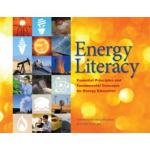
A new resource, Energy Literacy: Essential Principles and Fundamental Concepts for Energy Education, offers educators with guidance to help individuals and communities make informed energy decisions — including those related to climate change.
Energy is an inherently interdisciplinary topic. Concepts fundamental to understanding energy arise in nearly all, if not all, academic disciplines. This guide is intended to be used across disciplines. Both an integrated and systems-based approach to understanding energy are strongly encouraged.
Energy Literacy: Essential Principles and Fundamental Concepts for Energy Education identifies seven Essential Principles and a set of Fundamental Concepts to support each principle. This guide does not seek to identify all areas of energy understanding, but rather to focus on those that are essential for all citizens. The Fundamental Concepts have been drawn, in part, from existing education standards and benchmarks.
The intended audience for this document is anyone involved in energy education. Used in formal educational environments, this guide provides direction without adding new concepts to the educator's curriculum. This guide is not a curriculum. The Essential Principles and Fundamental Concepts offer a framework upon which curricula can be based without prescribing when, where, or how content is to be delivered.
The U.S. Department of Energy led the nationwide effort to develop Energy Literacy: Essential Principles and Fundamental Concepts for Energy Education. Thirteen federal agencies and numerous education partners across the country participated in the effort. NCSE is among the education partners on the project.
